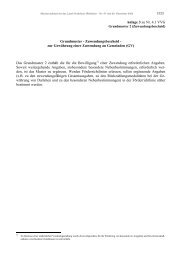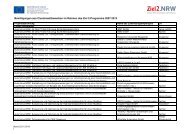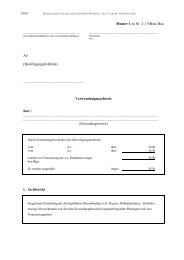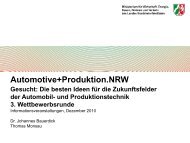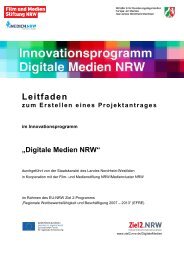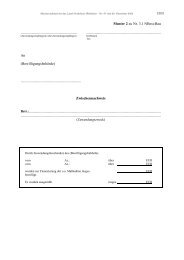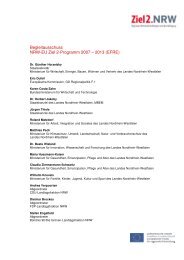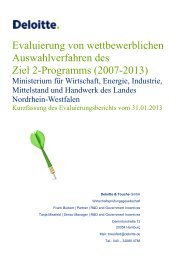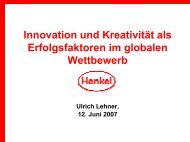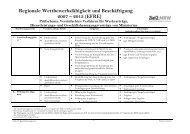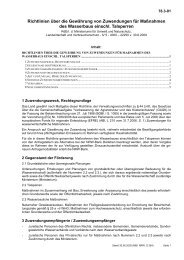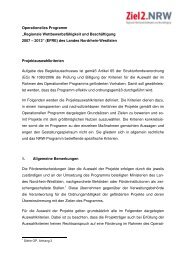Synthesis Report - European Commission - Europa
Synthesis Report - European Commission - Europa
Synthesis Report - European Commission - Europa
Create successful ePaper yourself
Turn your PDF publications into a flip-book with our unique Google optimized e-Paper software.
<strong>Synthesis</strong> <strong>Report</strong> Ex-post Evaluation of the ERDF 2000-2006<br />
The division of funding between different types of project varied just as much if not more than in<br />
the EU15. Overall some 36% of the ERDF directed to the environment went on infrastructure<br />
projects to extend access to clean drinking water and on waste and wastewater disposal and<br />
treatment, around 31% went on cleaning up polluted areas and maintaining the cultural heritage,<br />
while the rest was spread across other areas, such as developing renewable energy sources and<br />
combating air pollution.<br />
Infrastructure investment accounted for a particularly large proportion of environmental<br />
expenditure in Slovakia (64%), Latvia (60%) and to a lesser extent in Malta (54%), while the<br />
cleaning up of polluted areas was more important in Hungary (absorbing 55% of the ERDF going<br />
to environmental projects), Slovenia (50%) and Estonia (48%). In both Latvia and Lithuania, in stark<br />
contrast to the other countries, 40% or more of the ERDF in this area went to projects for<br />
improving energy efficiency.<br />
In Objective 2 regions in the EU15, 22% of the ERDF support provided went, on average, to<br />
environmental projects (Table 3.10). The proportion varied from 52% in Luxembourg and 31-32%<br />
in Italy and the Netherlands (where Objective 1 spending in this area was equally relatively high)<br />
to only around 9% in Sweden (where Objective 1 spending in this area was also relatively low) and<br />
7% in Denmark.<br />
In contrast to Objective 1 regions, relatively little of the ERDF going to this broad area went on<br />
supporting investment in environmental infrastructure (only around 20% of the total), reflecting<br />
the generally more developed nature of the regions assisted, though in Spain, a relatively large<br />
proportion of funding went on such support (43%). Most of the funding in most countries (around<br />
two-thirds overall) went on cleaning up polluted areas and maintaining the cultural heritage,<br />
though the last was important only in Spain and Italy. In the Netherlands and the UK, over 90% of<br />
the expenditure funded by the ERDF on environmental projects, was directed to this area together<br />
with preserving the natural landscape, while in Belgium, Germany, Luxembourg and Sweden, it<br />
was over 75%.<br />
In Austria and Finland, on the other hand, a significant proportion of funding (52% and 44%,<br />
respectively) went on supporting the adoption of environmentally-friendly technology by SMEs.<br />
These were the only two countries in which this was the case and where, accordingly, where the<br />
ERDF was used for potentially commercial purposes, to the extent that such technology could<br />
offer the firms concerned a competitive edge (see below), as well as, of course, reducing the<br />
pollution or emissions they caused (and therefore, the social costs of their operations).<br />
In the three EU10 regions receiving funding under Objective 2, a relatively large proportion of this<br />
went on environmental projects in both Praha and Bratislava (43% in the former, some 3<br />
percentage points less than initially planned, and 35% in the latter, 4 percentage points more<br />
than planned). In both, all, or nearly all, of the funding went to cleaning up polluted or rundown<br />
areas, predominantly parts of the two cities. In Cyprus, on the other hand, relatively little funding<br />
was allocated to environmental projects (11%), most of it to supporting the adoption of<br />
environmentally-friendly technology in SMEs (70%).<br />
94



